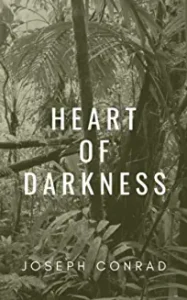Heart of Darkness by Joseph Conrad 1899
Charles Marlowe is sitting on the deck of the ship Nellie one night on the Thames as it awaits the turning of the tide so it can head out to sea when he confides his story to his three companions, the Accountant, the Lawyer, and the Director. Marlowe is a seaman, while the others are the movers and shakers whose profits depend upon Marlowe and his compatriots.
As a young man, Marlowe, in search of a livelihood and a career, finds a huge river, coiled like a snake which enters the interior of Africa, an empty space on the map he is examining. With references from an influential aunt, he is hired on as the captain of a paddle-wheel steamer heading 200 miles up the river to connect with the company’s agent, Kurtz, who has been shipping quantities of ivory to the coast but has been silent for some months.
Marlowe, after encountering extreme difficulties, manages to reach Kurtz who he finds dying in the midst of the ‘heart of darkness’ a phrase that applies equally to the African continent, the primitive situation of the natives, and Kurtz himself who has lost that ‘small matter which, when the pressing need arose, could not be found under his magnificent eloquence’. The ‘small matter’ is the moral core at the heart of civilized, social man, the restraint that keeps us from murder, theft, and a hundred other evil acts. Kurtz had gone ‘native’ engaging the local tribes to raid and pillage neighboring tribes, seizing ivory and collecting shrunken heads. Kurtz’s dying words, “The horror, the horror” summarize the overwhelming feeling of dread and fear as Marlowe takes the reader up the Congo.
This is a classic Conrad work. I was directed to it by its mention in several recent lit crit works. Virginia Woolf in her ‘Common Reader’ mentions Conrad as one of the few modern writers at the top of their game. In this work, Conrad creates an atmosphere of darkness in the setting (dense jungle, opaque river, oppressive weather) and in the characters both the ‘pilgrims’ from the commercial company as well as the natives and most of all Kurtz as he repetitively sets the stage with a feeling of doom. He makes this ‘heart of darkness’ universal by applying the term to London and the ‘civilized’ world of profit as well. The book is a classic because of this steady drum beat of darkness.
I’ve read a number of Conrad’s works and have always come away impressed and awed by his skill with the English language, his second after being born in Poland. This is a classic that bears reading again today.



